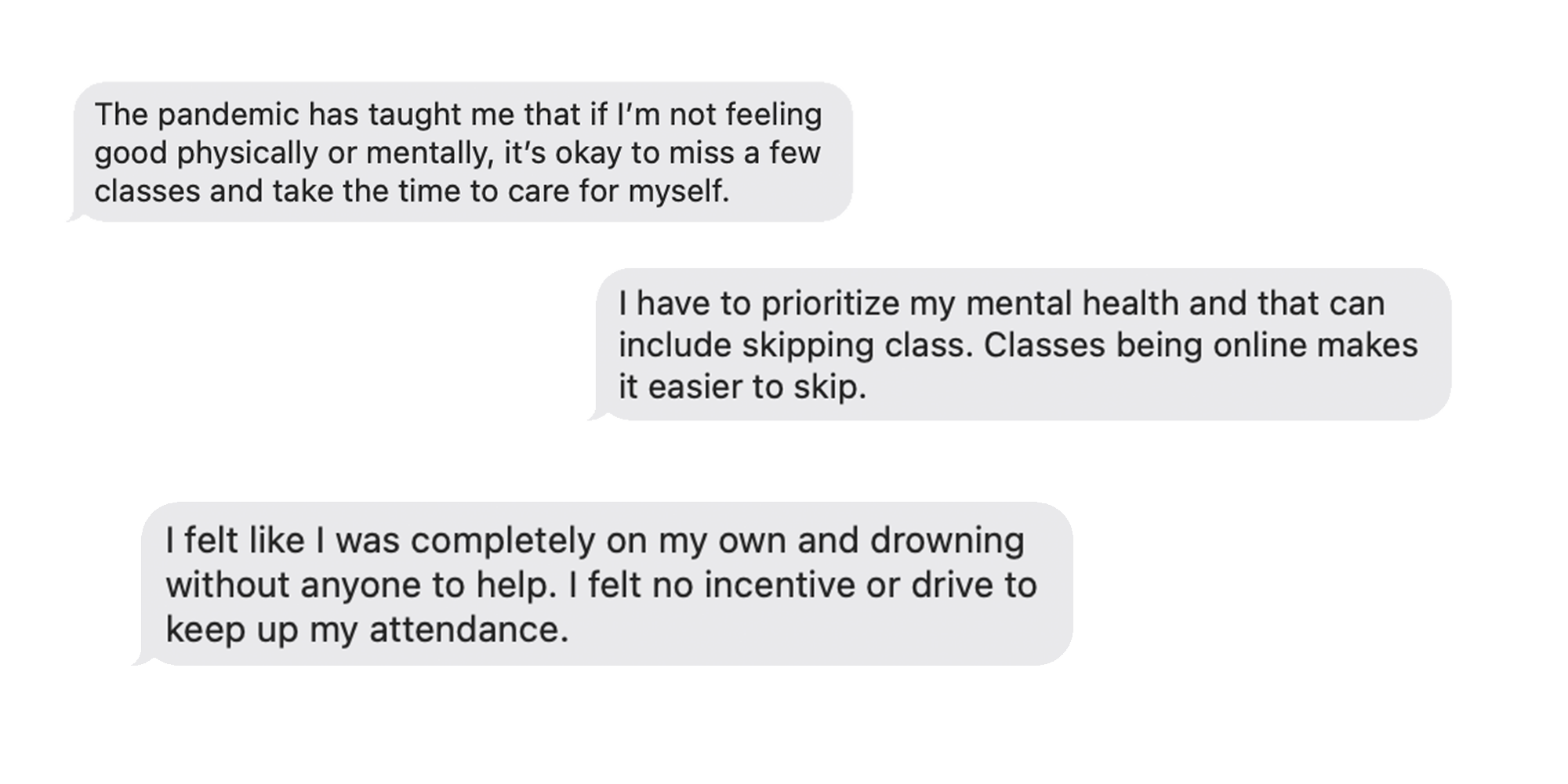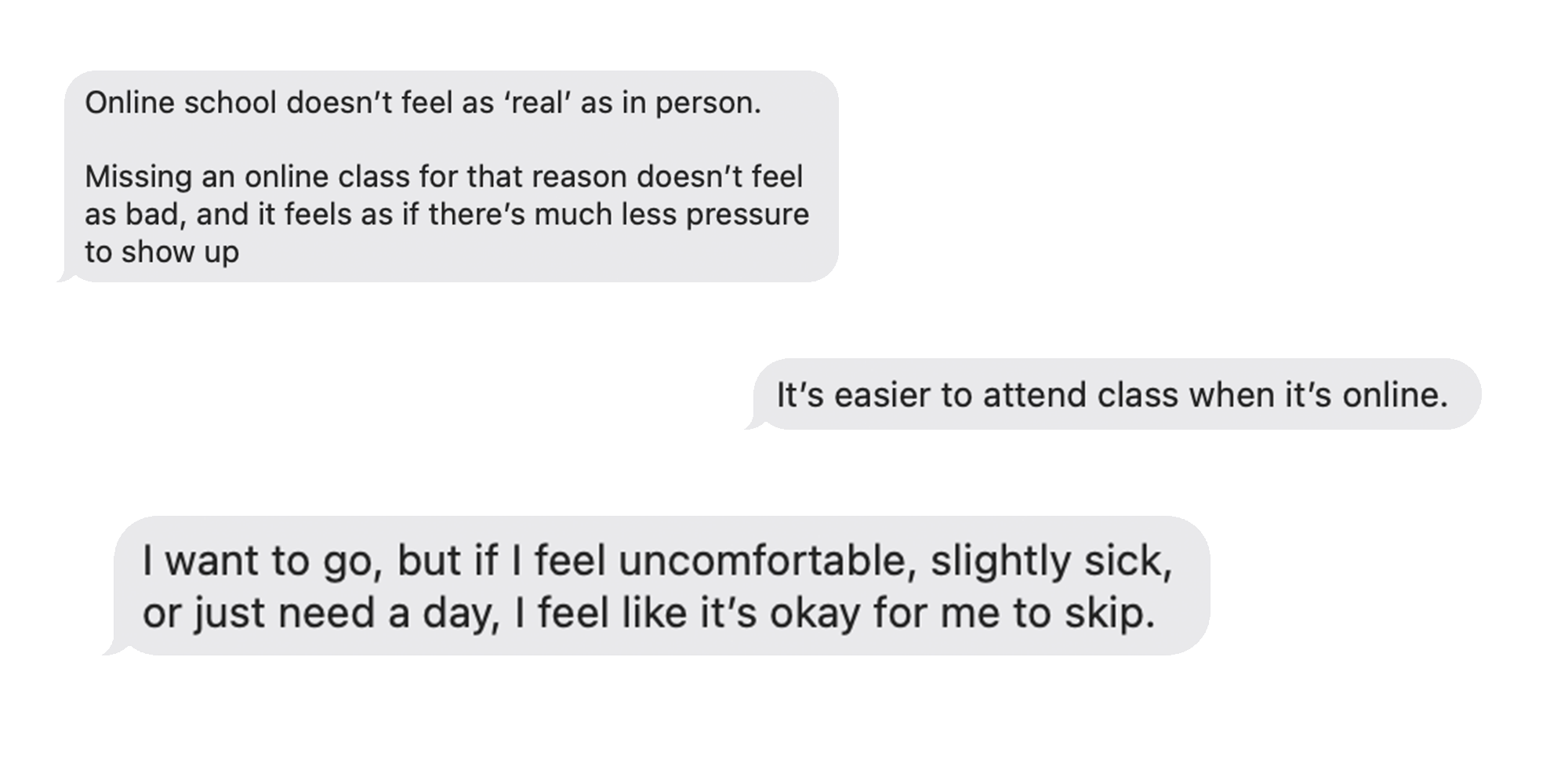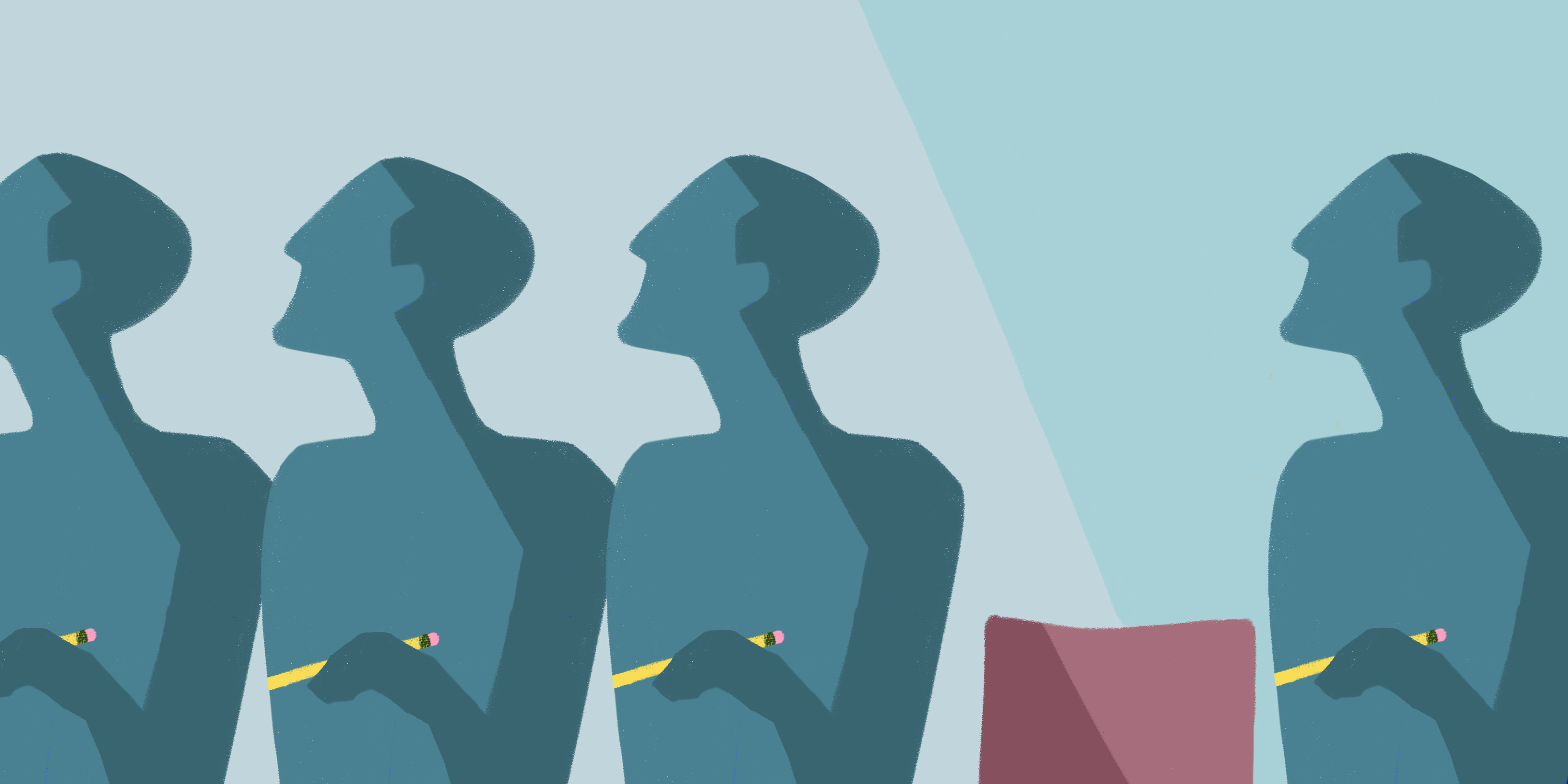COVID-19 has turned the tide on how students view what showing up for classes really means.
I arrived just in time for my political science class when I noticed how empty the classroom seemed. After I sat down, I noticed that my class of 17 students was reduced to a mere six attendees. Many of my peers had opted for the comfort of their home over the train ride or walk to class. My professor noted the absences and after a small lecture on perseverance, we continued on. I started to wonder if my classmates’ presence in the classroom was a matter of perseverance or something else entirely.
Chronic absenteeism, which is defined by The Illinois Report Card as missing 10% of all school days in a year without a valid excuse, has been rising since 2020. According to the Illinois Report Card, overall chronic absenteeism in K-12 children has risen 10% between 2020 and 2021, with absenteeism for students with Individual Education Programs rising 13%, low-income students rising 16% and Black students, who rose 20% in chronic absenteeism, being the demographic most impacted.
These numbers are a stark representation of the balance between work, school and home being broken because of stresses due to the pandemic. If we start to mix up places meant for relaxation with places meant for work, we start to lose the ability to unwind in these spaces all together.
In an interview with Healthline, psychotherapist and behavioral sleep medicine therapist Annie Miller explained: “When we use our bed for other activities, like working, reading, watching TV, etc., we create an association with wakefulness. We want the bed to be a cue for sleep, and working in bed weakens this association.”
In 2020, this constructed divide was shattered and destroyed.
Students are stressed. In a survey of 79 DePaul students, 60% said that their mental health has impacted their attendance.
Other students reported that mental health was the defining factor in their decision to skip class.
Malia Chan, a freshman at DePaul, said her attendance this quarter was impacted by the return to in-person learning.
“It was hard getting back into the swing of in-person classes when I wasn’t used to it,” Chan said.
Chan, like many students, is still trying to adapt to in-person classes. Many students became increasingly reliant on being able to log into classes, rather than traveling to campus for them. Once the option to stay in bed for classes was presented, it's hard to adapt to a situation where that option isn’t available. The American Psychological Association reported in a March 2021 study that 49% of Americans feel uneasy about adjusting to in-person interaction.
Apprehension for the Return to In Person
At the start of the pandemic, many had issues adapting to online – it’s no surprise that students are struggling to adapt back in person. Overwhelmed and overloaded, students can start to lack motivation.
“Mental health affected my attendance severely,” Chan said. “I just had an extreme lack of motivation. I wouldn't do the work, and then I wouldn't go to class. It was a cycle of no motivation.”
Liam Baldwin, a freshman at DePaul, said that his education has been impacted by his mental health.
“I get stressed and cannot focus on my classes. My mental health basically revolves around my workload because of my anxiety,” he said when talking about assignments beginning to pile up and the workload from classes overlapping.
Baldwin feels like this anxiety can become isolating. “I’ll just close myself off from people because the only thing my mind can focus on is work,” Baldwin said.
The problem of student stress and anxiety isn’t new. The problem is students now can opt out of classes with ease like never before. In some classes, all it takes is an email to the professor to say you're “a little under the weather.” It feels like professors are more likely to be more amicable to a sore throat than to an honest email about a panic attack. It is nice that students aren’t forcing themselves to come to class sick as professors are more flexible, but it is frustrating that students cannot be honest about why they can’t come to class or why they are behind.
Professors Are Also Adjusting
Students are not the only people who had to deal with the changing tides of academic life in the past two years. Professors have also had to learn how to best navigate the constant change that the pandemic has brought us, including how to manage attendance within their own classrooms. DePaul University decided a case-by-case basis would apply better to students, thus allowing professors to decide their own individual attendance policy.
Nancy Brown, an adjunct history professor at DePaul, wanted to provide her students a flexible schedule in wake of the pandemic.
“Prior to COVID, I calculated attendance by valuing the work students completed in class,” said Brown.
This, however, could not be implemented the same during the pandemic. While in-person participation would continue to count, Brown also ensured students would have a Zoom option for the Fall Quarter.
“I wanted to give students an opportunity to earn participation points,” Brown said.
Students in the class who had an illness didn’t have to force themselves to class for attendance points. This flexibility is important for those students who feel like they might be left behind in a class if they cannot attend physically.
Brown acknowledges the impact that mental health has on students.
“I see mental health as playing a large component in student attendance both prior to COVID and during COVID. Students who are depressed may struggle with motivation. Students who are struggling with anxiety may struggle with concentration and sometimes get trapped in a cycle of getting behind and then becoming even more anxious,” she said.
“The physical manifestations of mental illness might make it difficult to get out of bed due to sleep issues or medications that may have side effects.”
Brown expressed many of the same sentiments as students like Baldwin and Chan. Concerns over motivation, anxiety and getting trapped in a cycle can prevent students from succeeding academically.
It is a difficult situation for professors to try to set up a policy where students can succeed, whether they give a Zoom option, post lectures online or don’t take attendance. There are several costs and benefits to each one.
“Flexible attendance and deadline policies can help,” said Brown. “I do not feel that a Zoom option is the solution to attendance challenges. What I saw this semester was that the students who used it more than once tended to struggle in class,” she said. Brown, along with many other professors who use Zoom, feel like there just isn’t anything that replaces in-person classes.
Dick Farkas, professor of political science at DePaul since 1974, differs from Brown. He has never had a personal attendance policy. He did say he had one thing regarding attendance on his syllabus:
“Being in class, in my opinion, is crucial,” said Farkas.
For Farkas, providing a Zoom option for students encouraged the idea that showing up on Zoom is an acceptable replacement for in-person attendance.
“Without meeting students in class, we are discounting the value of what you can achieve,” he said.
He said that he noticed there were attendance issues during the Fall Quarter of 2021. He felt that the atmosphere that the university provides regarding attendance not only provides a way for students to skip but encourages it.
“In many ways, students have been encouraged to react over sensitively to the opportunity they have to use COVID as an excuse to not be in class,” he said.
"You say you have a mental health problem, I cannot see that. I have no way of validating it.”
Farkas also differs from many on the stance of students on mental illness. The conversation around mental health and its impact is something that Farkas feels opens up a way to encourage students to use more excuses.
“The danger that we become a society that aggressively seeks out excuses is a very dangerous pattern,” said Farkas.
In addition, Farkas said that he finds it is difficult to try to differentiate between who is struggling and who isn’t trying hard enough.
“It's too fashionable, it’s too easy. If you said you have a broken leg, I can see that. You say you have a mental health problem, I cannot see that,” said Farkas “I have no way of validating it.”
Mental illness is a very real problem that more people are starting to understand. Professors have the impossible task of trying to ensure a student’s academic success while also being sensitive to life problems. Each professor will have a different understanding and approach in doing so.
If students and professors are more willing to have a relationship based on honesty, maybe we can move towards tackling the problem of student attendance.
“Mental health is a serious real thing, I get that. There are mental-health issues that are altogether solvable by communication. There are some that are very serious, that cause instability,” Farkas said.
Regardless of how we feel about how the pandemic blurred the line between work and home, it's clear that we aren’t going to see a return to how things once were.
In the survey, many students commented on how they felt that the expectation on showing up to responsibilities has shifted. Some of the responses included prioritizing mental health.

Some commented on how attendance doesn’t feel as mandatory with online classes and felt that changing expectations had affected their outlook
 As technology evolves and attitudes change, so does our style of work. It has always been this way. In the Gilded Age, factory workers were expected to work 12 hours a day with no breaks. This evolved into a 5-day work week. This then involved taking work home. Now, we can predict another expectation shift, with the pressure of deadlines and attendance less strict. Only time can tell if this advancement will help reduce the anxiety of students and not reduce the effectiveness of education.
As technology evolves and attitudes change, so does our style of work. It has always been this way. In the Gilded Age, factory workers were expected to work 12 hours a day with no breaks. This evolved into a 5-day work week. This then involved taking work home. Now, we can predict another expectation shift, with the pressure of deadlines and attendance less strict. Only time can tell if this advancement will help reduce the anxiety of students and not reduce the effectiveness of education.
In taking a look back at my life as a student, I am reminded of the days where my mom allowed me to stay home. On the days where everything felt too heavy and too loud, my mom would allow me to take the day for myself. These mental-health days were crucial to my overall academic success. Instead of forcing myself through classes, and pushing my own emotional and mental limits, I took a break. I allowed myself to rest. My mom never made me feel like rest was something to be earned. I found that the understanding of rest being a right, instead of a privilege, helped my understanding of my own boundaries. I would return to school the next day with a balanced mental state, instead of a further fractured one.
Header image by Samarah Nasir
Graphics by Cam Rodriguez




NO COMMENT